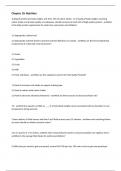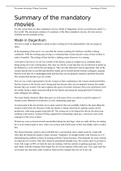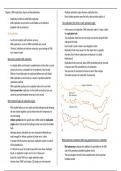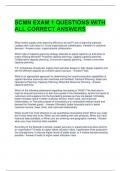What is psychological science?
Learning objectives:
• Define psychological science.
• Define critical thinking, and describe what it means to be a critical thinker.
• Identify major biases in thinking, and explain why these biases result in faulty thinking
1.1 Psychological Science Is the Study of Mind, Brain, and Behavlor
Mind refers to mental activity, which results from biological processes within the brain.
Behavior describes the totality of observable human (or animal) actions. The term
psychologist is used broadly to describe someone whose career involves understanding
mental life or predicting behavior.
→ Biological activity in the brain produces mental activity
1.2 Psychological Science Teaches Critical Thinking
The use of critical thinking skills improves how people think Amiable skepticism, an
important elemenent of science, requires a careful examination of how well evidence
supports a conclusion. Using critical thinking skills and understanding the methods of
psychological science are important for evaluating research reported in the popular media.
→ Amiable skepticism is being open to new ideas, but carefully considering the
evidence.
‘Tegenstellingen’:
- Nature → nurture ( nativisme - empirisme)
- Introspectie → gedrag ( sructuralisme - behaviorisme )
- Mind → body ( functionalisme - reductionisme )
1.3 Psychological Science Helps Us Understand Biased or Inaccurate Thinking
people engage in common errors in thinking. These errors probably evolved along with the
ability to quickly categorize information and make quick decisions. However, the errors often
result in faulty conclusions. Some common errors in thinking include ignoring evidence
(confirmation bias ) seeing relationships that do not exist. accepting after-the -fact
explanations, and taking mental shortcuts.
-Confirmation bias → angst voor spinnen dat je alleen aan grote spinnen kan
denken.
-Once people know an outcome they interpret and reinterpret old evidence to make sense of
the outcome, that is why you should always be suspicious of after-the-fact explanations.
- Niveaus van analyse:
• Sociale groepen → Hogere cognitieve processen, bewustzijn, culturele evolutie
• Organismen
• Cellen →Doelgericht gedrag
• Moleculen → Zelf-reproductie
Hoe hangen niveaus van analyse met elkaar samen? Als delen samengaan, krijgen de
gehelen nieuwe eigenschappen. Neuronen hebben geen bewustzijn, 60 miljard neuronen
wel.
,1.4 Think like a Psychologist: Why Are People Unaware of Their Weaknesses?
People often fail to see their own inadequacies. To tell the difference between good and bad
performance, people need the expertise to recognize the differences between them. A lack
of skill not only prevents people from producing good results, it also prevents those people
from knowing what good results are.
What Are the Scientific Foundations of Psychology?
Learning Objectives
• Trace the development of psychology since its formal inception in 1879.
• Define the nature/nurture debate and the mind/body problem.
• Identify the major schools of thought that have characterized the history of experimental
psychology.
1.5 Many Psychological Questions Have a Long History
The nature/nurture debate contrasted whether psychological characteristics are biologically
innate or are acquired through education, experience and culture. Nature and nurture
depends on each other. Their influences often cannot be separated. The mind/ body
problem was about whether the mind and body are separate and distinct or the mind is
simply the subjective experience of ongoing brain activity. Dualist notions about the
separation of the brain and mind have been replaced with the idea that the (physical) brain
enables the mind.
Nature: aangeboren
Nurture: aangeleerd
- Dualisme → verschijnselen zijn bepaald door factoren uit twee werelden zoals
(im)materiële. Brein en lichaam zijn van elkaar gescheiden.
1.6 Experimental Psychology Initially Focused on the Structure, Not the Function, of Mental
Activity
Psychology started as a formal discipline in 1879, in Wilhelm Wundt' laboratory in Germany.
Wundt realized that psychological processes, the products of physiologicaI actions in the
brain, take time to occur. Therefore, he used a method developed earlier, called reaction
time, to assess how quickly people can respond to events. Using the technique of
introspection, scientists attempted to understand conscious experience. Structuralists used
introspection to identify the basic underlying components of conscious experience.
According to functionalists, however, the mind is best understood by examining its functions
and purpose, not it’s structure.
-Functionalisme focust zich op evolutie
-Structuralistische stroming van psychologie onderzoekt het bewustzijn door objectief je
eigen waarnemingen te beschrijven.
1.7 Different Schools of Thought Reflected Different Perspectives on Mind, Brain, and
Behavior
Freud advanced the psychoanalytic approach that unconscious processes are not readily
available to awareness but nevertheless influences behavior. This understanding had an
,enormous impact on psychology. Gertalt psychologists asserted that the whole experience
(the gestalt) is different from the sum of its parts. Discoveries that behavior is changed by its
consequences caused behaviorism to dominate psychology until the 1960s. Humanism
focused on how people are free to choose activities that make them happy and bring them
fulfillment. Cognitivism and the computer analogy of the brain led to an emphasis on mental
activity.
-Behavioristen zien denkprocessen als iets onwetenschappelijks, omdat denken niet te
observeren is. Zijn zien denken ook als product van de omgeving, al het gedrag en het
denken van mensen komt door nurture (omgeving / opvoeding)
What Are the Latest Developments in Psychology?
Learning Objectives
• ldenliry recent developments in psychological science.
• Distinguish between subfields of psychology.
1.8 Biology Is Increasingly Emphasized in Explaining Psychological Phenomena
Tremendous advances in neuroscience have revealed the working brain. Mapping of the
human genome has furthered the role of genetics in analyzing behavior and disease. These
advances are increasing our knowledge of mind, brain and behavior. The scientific study of
genetic influences has made clear that very few single genes cause specific behaviors.
Almost all biological and psychological activity is affected by the actions of multiple genes.
1.9 Evolutionary Thinking ls Increasingly Influential
Evolution of the brain helped human ancestors solve problems related to survival and
reproduction and helped them adapt to their environments. Many modern behaviors reflect
adaptations to environmental pressure faced by our ancestors.
1.10 Culture Provides Adaptive Solutions
Cultural norms specify how people should behave in different contexts. They reflect solutions
to adaptive problems that have been worked out by a group of individuals, and they are
transmitted through learning.
1.11 Psychological Science Now Crosses Levels of Analysis
Psychologists examine behavior from various analytical levels: biologica (brain systems,
nemochemistry, genetics), individual (personality, preception, cognition), social
(interpersonal behavior), and cultural ( within a single culture, across several cultures).
Hoofstuk 1 begrippenlijst:
psychological science: The study, through research, of mind, brain, and behavior.
critical thinking: Systematically questioning and evaluating information using well-
supported evidence.
Culture: The beliefs, values. rules, and customs that exist within a group of people who
share a common language and environment.
naturt/nurture debate: The arguments concerning whether psychological characteristics
are biologically innate or acquired through education, experience and culture.
mind/body problem: A fundemental psychological issue: Are mind and body separate and
distinct, or is the mind simply the physical brain's subjective experience?
, introspection: A systematic examination of subjective mental experiences that requires
people to inspect and report on the content of their thoughts.
structuralism: An approach to psychology based on the idea that conscious experience can
be broken down into its basic underlying components.
stream of consciousness: A phrase coined by William James to describe each person's
continuous series of ever-changing thoughts.
functionalism: An approach to psychology concerned with the adaptive purpose, or
function, of mind and behavlor. It focus on the function of adaptive behavior.
evolutionary theory: A theory presented by the naturalist Charles Darwin; lt views the
history of a species in terms of the inherited, adaptive value of physical characteristics, of
mental activity, and of behavior
Adaption: the physical characteristics, skills or abilities that increase the chances of
reproduction or survival and are therefore likely to be passed along to future generations.
Natural selection: the idea that those who inherit characteristics that help them adapt their
particular environments have a selective advantage over those who don’t.
Gestalt theory: the whole is different from the sum of its parts. (een triangle is een geheel
en niet 3 strepen aan elkaar getekend) Tegenovergestelde van structuralistische
psychologie
Unconscious : the mental processes that operate below the level of conscious awareness.
Psychoanalysis: a method developed by Freud that attempts to bring the contents of the
unconscious into conscious awareness so that conflicts can be revealed. (natuurlijke driften)
Behaviourism: emphasizes the role of environmental forces in producing behaviour.
(nurture, alles is aangeleerd door omgeving)
humanistic psychology: This approach focuses on the basic goodness of people and how
they become happier and more fulfilled.
Cognitive psychology: the study of how people think, learn, and remember.
Cognitive neuroscience: the study of the neural mechanisms( brain, nerves etc.) that
underlie thought, learning and memory.
Social psychology: the study of how people are influenced by their interactions with others
( groups)
How does the nervous system operate?
Learning Objectives
• Distinguish between the two basic divisions of the nervous system.
• Distinguish between the functions of distinct types of neurons.
• Describe the structure of the neuron.
• Describe the electrical and chemical changes that occur when neurons communicate.
• Identify the major neurotransmitters and their primary functions.
3.1 Neurons Are the Basic Units of the Nervous System
human nervous system is divided into two basic units: the central nervous system (the brain
and the spinal cord) and the peripheral nervous system (all the other nerve cells in the rest
of the body). Nerve cells, or neurons, are the basic units of the nervous system. Neurons are
linked as neural networks, and neural networks are linked together. Neurons receive and
send electrical and chemical messages. All neurons have the same basic structure, but
neurons vary by function and by location in the nervous system. Sensory ( info from the skin)
and motor neurons ( direct muscles ) work together to control movement.












